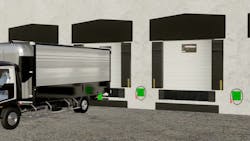Southern California Edison approves additional ESL shore-power stations
After being the first manufacturer of eTRU docking stations to be approved by Southern California Edison (SCE) for its Charge Ready program, SCE has approved five additional ESL eTRUconnect models for inclusion in its landmark campaign.
The new models address an industry need to power 240-volt units, standard ISO refrigerated containers, and to daisy-chain up to four units from the same electrical circuit, according to ESL Power Systems.
In addition to providing EV charging infrastructure, SCE’s Charge Ready Transport Program provides funding initiatives for installation of eTRU infrastructure to its commercial customers. Through this program, SCE’s goal is to advance the vision for a clean energy future, while providing medium- and heavy-duty fleet owners the opportunity to save money.
The program is offering opportunities such as no-cost installation of electric infrastructure or giving businesses the option to install, own, operate and maintain the infrastructure on site for a rebate up to 80% of cost. SCE also is offering special incentives such as commercial rate options that make EV charging and TRU shore power more affordable during certain times of the day. Connecting electric or hybrid refrigerated units to ESL’s eTRUconnect truck-trailer shore power eliminates the need of running on-board diesel generators/engines to keep the cargo within the optimal temperature range. This results in significant savings attributed to much lower energy and maintenance cost.
“Being the first eTRU standby connection solution on SCE’s Charge Ready Transport Approved Product List (APL) is a great honor for ESL. With the additional products available to SCE’s customers we are now confident we will be able to address the various requirements in this space,” said Carlos Valero, director of commercial operations.
“Even though there is no mandated standard for eTRU connections, the vast majority of the industry has adopted the standard IEC pin and sleeve connectors for hybrid refrigerated trailers. We believe that having a pin-and-sleeve solution that is non-proprietary provides customers the added benefit of utilizing the inlet that comes already installed with most OEM equipment, making the transition to electrify fleets more economical.
“The additional offerings will support multiple stakeholders in their efforts to electrifying on site infrastructure. Improving the environmental impact of the trucking industry is paramount to ESL and we are dedicated to listening to our customers who are the source of all our innovation efforts.”
A TRU hybrid future
Transport refrigeration units, commonly referred to as TRUs, are refrigeration systems that are typically powered by internal combustion engines. TRUs control the environment of temperature-sensitive products that are transported in refrigerated trucks, trailers, railcars and shipping containers. TRUs are used to transport and store many products such as food, pharmaceuticals, plants, medicines and chemicals.
Some companies use TRUs for extended cold storage. Distribution centers and grocery stores may run out of cold storage space in their buildings and then opt to store overflow goods in TRU-equipped trucks and trailers outside their buildings. Distribution centers, truck stops and other cold storage facilities also attract large volumes of TRUs that contribute to higher localized health risks. New regulations are developing concepts to reduce emissions from facilities with TRU activity by transitioning to zero-emission operation where practical.
In addition to SCE’s infrastructure programs, CARB’s Clean Off-Road Equipment Voucher Incentive Project (CORE) features a streamlined voucher process for buyers to receive funding to offset the adoption costs of clean, commercial ready zero-emission equipment, including transport refrigeration units, cargo-handling equipment, and more. CARB also is offering eligibility opportunities to offset electricity costs through the Low Carbon Fuel Standard (LCFS) Program which is designed to encourage the use of cleaner low-carbon fuels in California, encourage the production of those fuels, and therefore, reduce greenhouse gas emissions.
Charge Ready Transport, LCFS and CORE are some of the many incentives available in California that provide opportunities to reduce an organization’s carbon footprint and improve the air quality of the surrounding community, all while cutting fleet operation and maintenance costs.
Learn more about SCE’s Charge Ready Transport at crt.sce.com/overview.
Visit eslpwr.com/etruconnect for more information.




